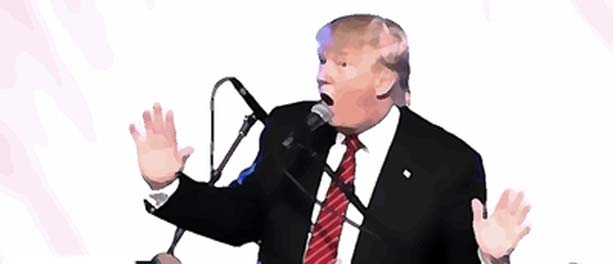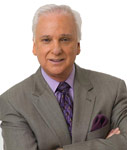
There's a question journalists have been wrestling with ever since they realized that Donald Trump was more than a flash in the pan: Should they call him a liar, and his statements lies, when he says things that are clearly untrue?
When he said that he saw thousands of Muslims celebrating in New Jersey on 9/11 - that wasn't true, but was it a lie, or did he really believe it?
Or when he said that millions of illegals voted in the presidential election - there's not a shred of evidence to support the allegation, but again, did Donald Trump lie?
He was a prominent voice in the so-called birther movement, contending Barack Obama was not born in the United States. Another false statement, but if Donald Trump, for whatever nutty reason truly believed it, was he lying?
Trump said Hillary Clinton "soundly slept in her bed" during the 2012 attack in Benghazi, Libya. The attack happened at 3:30 in the afternoon Washington time.
He said Ted Cruz's father “was with Lee Harvey Oswald” before the assassination of President John F. Kennedy. This was based on nothing more than a grainy picture in a dopey tabloid.
Reasonable people would say that Donald Trump should have known these statements were not true. Fair enough. But maybe he didn't. Maybe he's wired in such a way that he believes all sorts of things that reasonable people don't believe. Telling a lie involves motive. Lying is more than simply passing along information that isn't true.
I've been in journalism for a long time but I can't remember ever characterizing anyone I interviewed as a liar, though there probably were a few who were. I know that what some politicians and others told me wasn't true — and I pointed that out — but I don't know what was going on inside their heads. Were they trying to deceive or were they simply making a mistake?
So it's possible that Donald Trump isn't actually lying when he gets so many things wrong. It's possible he really believes the nonsense he so often spouts. And if that's true, then we have a bigger problem with the president-elect than whether he's allergic to the truth, though that's obviously no small issue. Having a president who is delusional just might be a tad more serious.
It's one thing for a column on the left-wing Media Matters website to begin a piece with this: "When Donald Trump is inaugurated later this month, the presidency will officially be held by an inveterate liar." It's quite another for the New York Times to call him a liar — on page one. But on at least one occasion, the Times essentially did just that.
In its front page headline, the Times declared that a Trump statement about President Obama's birth certificate was not simply false — but a "lie." Still, calling his statements lies or calling him a liar are rare in the mainstream media.
And while journalists are busy weighing the ethical implications of Donald Trump's misstatements, I don't recall such handwringing over false statements made by our current president.
Nearly 40 times President Obama told the American people that if you liked your doctor you could keep your doctor and if you liked your healthcare plan you could keep your healthcare plan. This was demonstrably false - and millions of Americans who lost their doctor or their plan or both can attest to the falsity of the statement. But was it a lie?
Maybe the president intentionally misled the American people to get his cherished healthcare idea passed into law. If he did, that would be a lie. But it's also possible President Obama wasn't intentionally trying to mislead but actually didn't know what he was talking about. In other words, it's possible he was incompetent, but not knowingly dishonest.
The point isn't whether Barack Obama lied about the Affordable Care Act or whether Donald Trump lies on a regular basis or simply spouts off when the mood strikes him. This is about journalists applying the same standard to people they like as to people they don't like. How's that for a novel idea?
Hard-core partisans on both sides have no time for subtlety. Trump's liberal critics know with absolute certainty that he's a liar — just as Hillary Clinton's critics know she was lying about all sorts of things during the campaign.
But news reporters shouldn't be partisans, hard-core or otherwise. And they're certainly not psychiatrists who can divine what Donald Trump is thinking. If the past is any indication, we know that when he becomes president he will almost certainly say things that are not factually correct. But journalists are not expert enough to know what actually motivates him to say so many things that just aren't true.
This was a point made by Gerard Baker, the editor in chief of the Wall Street Journal on Meet the Press. "I'd be careful about using the world 'lie,’" he said. "'Lie' implies much more than just saying something that's false. It implies a deliberate intent to mislead."
So here's an idea for the new year: Unless there’s a smoking gun, how about if journalists report what President Trump says and if it's not true also report that. But they should leave it to you, the news consumer, to decide whether he's a liar — or something else.
Comment by clicking here.
JWR contributor Bernard Goldberg, the television news reporter and author of several bestselling books, among them, Bias, a New York Times number one bestseller about how the media distort the news. He is widely seen as one of the most original writers and thinkers in broadcast journalism. Mr. Goldberg covered stories all over the world for CBS News and has won 10 Emmy awards for excellence in journalism. He now reports for the widely acclaimed HBO broadcast Real Sports.
He is a graduate of Rutgers University, New Brunswick, New Jersey and a member of the school's Hall of Distinguished Alumni and proprietor of BernardGoldberg.com.


 Contact The Editor
Contact The Editor
 Articles By This Author
Articles By This Author